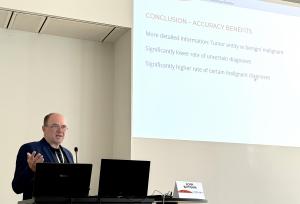X-ZELL outperforms traditional immunostaining in German landmark study
LEIPZIG, GERMANY, July 17, 2024 /EINPresswire.com/ -- New research from Germany has shown that X-ZELL technology could dramatically reduce the number of inconclusive cancer diagnoses from minimally invasive sample material.
During a lecture given at the 45th European Congress of Cytology (ECC) in Leipzig last month, PD Dr. Achim Battmann, chief pathologist at MVZ Frankfurt in Germany, presented interim data from a study carried out in collaboration with the Central Institute for Laboratory Medicine at Northwest Hospital Frankfurt, led by Prof. Dr. Klaus-Peter Hunfeld.*
The blinded 213-patient study is the continuation of a pilot study1 presented at last year’s ECC in Budapest, Hungary, which demonstrated that X-ZELL’s Next-Generation Cytology (NGC) platform could clearly distinguish malignant and non-malignant samples in a clinical routine setting.
The team now performed a head-to-head comparison of NGC with traditional cell-blocking and immunohistochemistry (IHC) to understand the technology’s true potential for clinical routine use.
According to Dr. Battmann, 25 patients (11.7%) were diagnosed with cancer using IHC. X-ZELL’s NGC technology correctly identified all of them and helped another 32 patients (15.0%) receive a conclusive diagnosis who would have otherwise not been diagnosed with the standard method – leading to anxious waiting, repeat testing and delayed treatment.
Testing these samples with the NGC alternative correctly diagnosed cancer in 16 of the 32 patients, and benign conditions in the other 16, as confirmed by downstream imaging and tissue biopsy.
Dr. Battmann concluded that NGC avoided both false negative and false positive diagnoses, with an increase in true positive diagnoses from 11.7% to 19.2%. In practice, he said this would deliver a “significant improvement” in diagnostic accuracy and patient care.
“I’ve been working with NGC for a while now, but even I didn’t expect the data to be quite so explicit,” commented Dr. Battmann. “It’s the first time in decades a new technology has come along that could genuinely change how we diagnose cancers from minimally invasive samples.”
According to Dr. Battmann, NGC only uses one microscope slide where traditional methods require multiple, leading to more economical sample usage and a significant cost advantage over the traditional workflow.
In combination with a 90% reduction in processing time due to the omission of the resource-intensive cell-blocking step, he said X-ZELL had the “potential to be a game-changer” in modern cytopathology.
“Even though our analysis is not yet concluded, the data is quite obvious – we get more detailed information on the tumour from less material. This leads to a significantly lower rate of uncertain diagnoses and a significantly higher rate of certain malignant diagnoses.”
---
More about the 2024 European Congress of Cytology and the full event program on the official website: https://cytology2024.eu/
*Dr. Battmann’s lecture was given as part a special Effusion Pathology session chaired by Dr. Ralf Heine, Chief Physician at St. Elisabeth & St. Barbara Hospital Halle/Saale in Germany, and Ben Davidson, Senior Pathologist at Norwegian Radium Hospital in Oslo, Norway, as well as Professor of Pathology at the University of Oslo.
Sebastian Grote
X-ZELL Biotech Pte. Ltd.
info@x-zell.com
1 https://www.x-zell.com/news/frankfurt/

